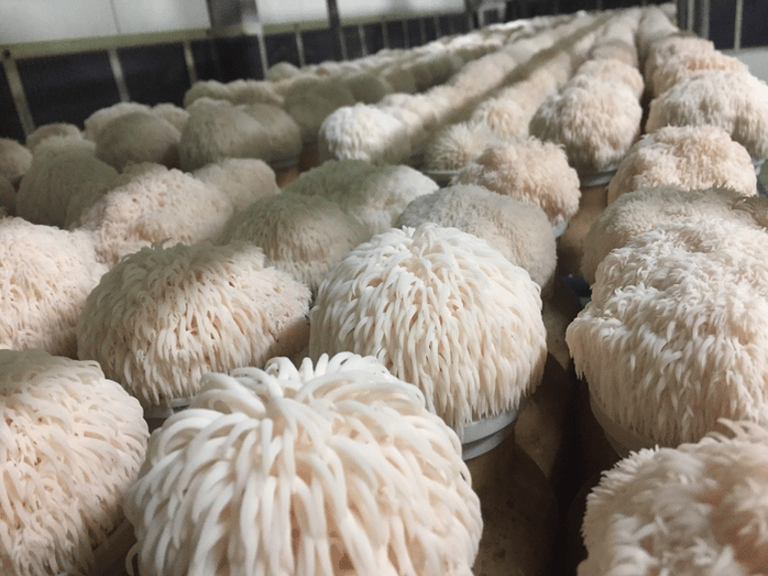Lion's Mane and its benefits for BDNF // Lion's Mane e seus benefícios para o BDNF
A few days ago, I received an interesting quantity of Lion's Mane, known here in Brazil as "Juba de Leão", as a gift from a friend. So I've been able to explore the substance and finally find out whether its benefits are notable. It seems to me that much of what is known about this mushroom is still part of scientific research in neurology, psychiatry and brain health in general. So the information about it is probably shallow, but I hope that in this article I can clarify at least the basic issues surrounding the subject.
Source
Hericium erinaceus is the name of the mushroom known as Lion's Mane. It grows in various parts of the world, but is most common in Asia and Europe. In China, for example, a dish prepared with it is called "Hóu Tóu Gu" (猴头菇) or "Monkey's Head Mushroom", and is widely consumed there. Despite the different name it receives in China, its "hairy" appearance gives it the nickname Lion's Mane, it has a very delicate and beautiful appearance to appreciate, and in culinary terms, its soft texture gives a special value to dishes.

Source
Now to the technical details: Lion's Mane has polysaccharides (bioactive compounds) that play the main role in its benefits, among which Erinacin and Hericenone are the substances most targeted in cutting-edge research into neuroprotection. They are the substances responsible for stimulating BDNF, the so-called Brain-Derived Neurotrophic Factor. BDNF is a protein that stimulates brain plasticity, neuron growth and the survival of brain cells. According to some of the most recent studies, the neurogenesis triggered by daily consumption of Lion's Mane is mainly related to memory and learning, which leaves an opening for research into the possible benefits of the substance in damaged brains, for example. In addition to the stimulation of BDNF, there is also anti-inflammatory potential in the use of Lion's Mane, which consequently helps the body (including the brain) to recover, thus triggering a significant improvement in the body and automatically, a cognitive improvement as well.

Source
More systematically, Lion's Mane can be said to improve cognition, especially memory and concentration. There is also some evidence showing benefits for the treatment of Anxiety and Depression, mainly through the regulation of BDNF. And finally, neurological protection against oxidation and inflammation. And I'll end the article by giving some guidelines on its use: as it is a mushroom widely used in cooking, it is known that there is no specific rule regarding the exact quantities to be consumed, but it is understood that a daily supplementation of at least 1 to 2 grams of dried mushroom over a long period brings more perceptive benefits. Lion's Mane is not a psychoactive substance that can be immediately perceived. This is not the purpose of its use, but rather to understand it as a fixed supplement in your routine.

Português
Recebi há alguns dias de presente de um amigo uma quantidade interessante de Lion's Mane, chamado aqui no brasil de "Juba de Leão". De forma que estou podendo explorar a substância e enfim descobrir se seus benefícios são notáveis. Parece-me que muito do que se sabe porém à respeito deste cogumelo é ainda parte de uma pesquisa científica que engatinha na neurologia, psiquiatria e saúde cerebral em geral. De forma que as informações à respeito disso são provavelmente rasas, mas espero nesse artigo poder esclarecer ao menos as questões básicas envolvendo o tema.
Source
Hericium erinaceus é o nome do cogumelo conhecido como Lion's Mane, ele cresce em várias partes do mundo, mas é mais comum na Ásia e Europa, ele já era apreciado na culinária há centenas de anos. Na China por exemplo um prato preparado com ele chama-se "Hóu Tóu Gu" (猴头菇) ou "Cogumelo da Cabeça do Macaco", e é muito consumido por lá. Apesar do nome diferente recebido na China, sua aparência "peluda" dá o apelido de Juba de Leão, tem um aspecto muito delicado e belo de se apreciar, em termos culinários, sua textura macia dão um valor especial aos pratos.

Source
Entrando agora no que interessa, seus detalhes técnicos: Lion's Mane tem Polissacarídeos (compostos bioativos) que ocupam o papel principal nos seus benefícios, dentre eles a Erinacina e a Hericenona são as substâncias mais visadas na pesquisa de ponta à respeito de neuroproteção. São elas as substâncias responsáveis pela estimulação do BDNF, o chamado Fator Neurotrófico Derivado do Cérebro. O BDNF é uma proteína que estimula a plasticidade cerebral, o crescimento de neurônios e a sobrevivência das células do cérebro. Ao que indicam alguns dos estudos mais recentes, a neurogênese desencadeada pelo consumo diário de Lion's Mane está relacionada principalmente a memória e ao aprendizado, o que deixa uma abertura de pesquisa para os possíveis benefícios da substância em cérebros danificados, por exemplo. Além da estimulação do BDNF ainda existe um potencial anti-inflamatório no uso do Lion's Mane, o que por consequência auxilia na recuperação do corpo (inclusive do cérebro), desencadeando assim uma melhora significativa do corpo e automaticamente, uma melhora cognitiva também.

Source
De forma mais sistemática, pode-se afirmar que o Lion's Mane tem capacidades de melhorar a cognição, principalmente memória e concentração. Existem algumas evidências ainda que demonstram benefícios para o tratamento de Ansiedade e Depressão, principalmente pela regulação do BDNF. E por fim, proteção neurológica contra oxidação e inflamação. E finalizo o artigo dando algumas diretrizes sobre seu uso: sendo um cogumelo amplamente utilizado na culinária, sabe-se que não existe uma regra específica à respeito de quantidades exatas a ser consumida, porém entende-se que uma suplementação diária de pelo menos 1 a 2 gramas do cogumelo seco, por um longo período traz benefícios mais perceptivos. Lion's Mane não é uma substância psicoativa de percepção imediata, não é essa a proposta de uso e sim entende-lo como um suplemento fixo em sua rotina.
Your post was manually curated by @Shiftrox.
Delegate your HP to the hive-br.voter account and earn Hive daily!
🔹 Follow our Curation Trail and don't miss voting! 🔹
Thanks for your contribution to the STEMsocial community. Feel free to join us on discord to get to know the rest of us!
Please consider delegating to the @stemsocial account (85% of the curation rewards are returned).
You may also include @stemsocial as a beneficiary of the rewards of this post to get a stronger support.